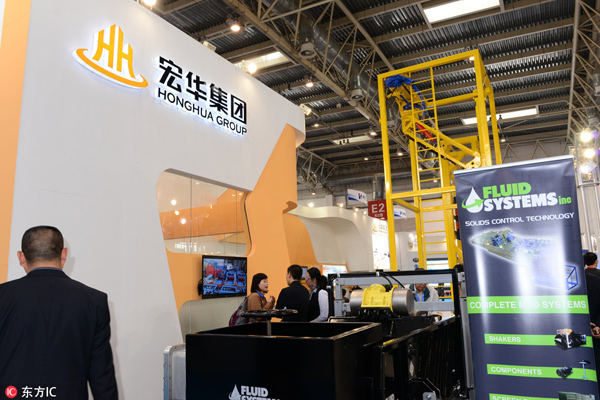Honghua lands big deal to build US LNG facility
 |
|
A stand of Honghua Group at the 14th China International Petroleum & Petrochemical Technology and Equipment Exhibition in Beijing, March 19, 2014. [Photo / IC] |
Chinese onshore drilling rig maker Honghua Group said it had signed its first offshore deal, to build a giant LNG facility in the Gulf of Mexico for US company Argo LNG Partners LLC, in a contract worth about $1.8 billion.
The deal was inked by Honghua's unit Shanghai Honghua Offshore Oil and Gas Equipment Co and Argo, and the first phase of construction is scheduled to take two to three years.
The liquefied natural gas facility will comprise four production platforms, four storage platforms, an accommodation platform, one central processing platform and a pier for LNG ships. Its annual processing capacity and storage capability will be up to 3.6 million metric tons and 240,000 cubic meters, respectively.
Honghua Chairman Zhang Mi said the integration of a port and LNG facilities using Chinese manufacturing processes could help lower costs.
He said the first phase of the LNG plant would be delivered to clients using a modular manufacturing process and employing the world's biggest offshore crane with a lifting capacity of 22,000 tons.
"The cooperation not only presents a Sino-US break-through in development and utilization of clean energy, but a significant and innovative cooperation between the two parties in manufacturing high-end equipment," Zhang said.
LNG is a clean and non-toxic liquid which is formed when natural gas is frozen to minus 126 C for easier storage and transportation.
According to Platts, the leading independent provider of information and bench-mark prices for the commodities and energy markets, demand for LNG in China has been rising and the US as a LNG producer would be targeting the Chinese market in the future.
Total Chinese LNG imports in 2016 so far are up by about 18 percent year-on-year and US LNG is relatively cheap compared with other sources of LNG, said senior Platts correspondent Stuart Elliot.
China imports LNG from several countries. The more alternatives available, the cheaper LNG could be procured, Elliott added.
Zhang said the US would become the biggest LNG exporter in the world, while natural gas consumption in China was increasing rapidly due to enforcement of environmental protection rules.
Honghua said that last year natural gas consumption in China was less than 200 billion cu m, counting for less than 6 percent in terms of total amount of primary energy consumption, far lower than the global average level of 24 percent.

















